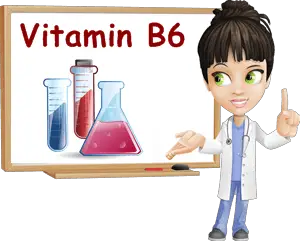Pyridoxine or vitamin B6 is part of the B complex or B vitamins. Pyridoxine not only plays a crucial part in more than 100 chemical reactions within our body, but also boasts a variety of health benefits. For instance, an adequate intake of pyridoxine (or vitamin B6) helps us cope with stress more easily and, at the same time, strengthens our immune system. Being a water-soluble vitamin, pyridoxine dissolves in water. Any excess is rapidly eliminated through urine.
Certain medical conditions can have our body use up a lot or most of our vitamin B6 and develop a more or less severe deficiency. Alcohol consumption, alcoholism in particular, diseases of the liver and thyroid problems, malnutrition, diabetes, HIV can all deplete our body of vitamin B6. A deficiency can manifest through symptoms such as drowsiness, skin symptoms (rash, itchiness, redness) and nervous system disorders brought on by impaired nerve function in various nerves and their specific manifestations.

Vitamin B6 is essential for good health. All vitamins are. But why is it so important that we have a good intake of vitamin B6 in particular? Because of its utmost diverse role in human health: from helping the body use the mineral selenium for thyroid health which, in turn, has deep implications for fertility, energy metabolism and many more health aspects, to regulating the energy metabolism for elevated energy levels and anti-inflammatory and immune system-boosting properties. See below what are the top 8 reasons why vitamin B6 (pyridoxine) is good for you.
What are the benefits of vitamin B6?
Supports normal cell growth
Vitamin B6 is a major component of DNA nucleic acids and the basis for amino acids synthesis. Basically, vitamin B6 is necessary for the formation of both DNA and amino acids and thus it helps create new cells in the body. Note: amino acids form proteins.
Supports processes at cellular level
Phospholipids, lipids that form all cell membranes, require vitamin B6. This ensures cells can function optimally and carry out basic life-sustaining processes. Potatoes, nuts, bananas, apples, chicken meat, turkey, spinach and sunflower seeds are some of the best sources of vitamin B6.
See article on vitamin B6: pyridoxine.

Supports carbohydrate synthesis
Vitamin B6 helps break down carbohydrates in order to produce energy for various body functions. In addition to this, vitamin B6 is responsible for glycogen synthesis, glycogen being a form of starch stored in our muscles and used as energy source during physical exercises.
Modulates the immune system
Vitamin B6 supports cell growth and, through this, it helps maintain healthy lymphoid organs: spleen, thymus, lymph nodes, tonsils, digestive tract. Healthy lymphoid organs produce sufficient white blood cells or leukocytes, which protect our body against infections and diseases.
Supports the activity of the nervous system
Vitamin B6 performs a task of great importance within the human body: it increases the quantity of oxygen transported to cells and tissues during more intense physical activity. Taking the stairs or running after the bus, for example, are activities that require more oxygen.
Potent anti-inflammatory properties
According to recent studies, vitamin B6 can efficiently reduce inflammation and thus prevent potentially life-threatening medical conditions such as cardiovascular disease, type 2 diabetes and obesity.
Helps with the absorption of selenium
Vitamin B6 actively participates in the processes that allow our body to process and use one of the most common forms of selenium, a crucial nutrient for good health. Without it, our body could not absorb selenium from the foods we eat.
Helps maintain a healthy thyroid
As mentioned above, vitamin B6 helps us absorb selenium. But selenium is necessary for the production of several types of thyroid hormone and required for the good functioning of all cells that work with thyroid hormone. This is why a lack of vitamin B6 alters normal thyroid function and thyroid hormone imbalances are a sign of vitamin B6 (and selenium) deficiency.
Vitamin B6 deficiency symptoms
Vitamin B6 (pyrdoxine) deficiency may include the following symptoms: tiredness, eczema, sore tongue, cognitive problems or anemia. Severe vitamin B6 deficiency may lead to convulsions and seizures.
Conclusion
As with all vitamins, it is crucial that we meet our daily requirements. Vitamins are alike components of a system: each and every one of them is pivotal to the success of the system as a whole and they all work together towards this goal. Each vitamin fulfills specific functions within the human body. If there is an insufficient intake of just one, then the whole machine – that is, the human body – doesn’t work flawlessly. Vitamin B6 is one these marvelous components which contribute immensely to our good health and general well-being.
